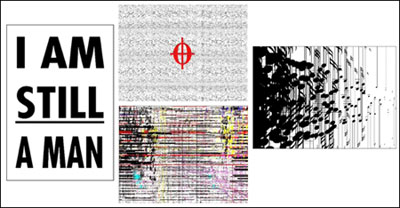 As an interdisciplinary artist, Rucker integrates live performance, sound, original compositions, and visual art. His work has been supported by grants and residencies from 4Culture, Seattle Mayor’s Office of Arts and Cultural Affairs, South Carolina Arts Commission, Washington State Arts Commission, King County Site Specific, Photo Center NW, Artist Trust, Blue Mountain Center, Ucross Fdn., Art OMI, Banff Centre, Pichuk Glass School, Rockefeller Foundation Study Center in Bellagio, Italy, Headlands Center for the Arts, and Creative Capital. Rucker has created public artwork for the Museum of Flight in Seattle, 4Culture, and the City of Tacoma. He was named Best Emerging Artist of 2004 from Earshot, 2005 Jazz Artist of the Year from the Seattle Music Awards, and Outstanding Jazz Ensemble of the Year in 2008. In 2007, he performed for the opening of David Lynch’s film, Inland Empire.
As an interdisciplinary artist, Rucker integrates live performance, sound, original compositions, and visual art. His work has been supported by grants and residencies from 4Culture, Seattle Mayor’s Office of Arts and Cultural Affairs, South Carolina Arts Commission, Washington State Arts Commission, King County Site Specific, Photo Center NW, Artist Trust, Blue Mountain Center, Ucross Fdn., Art OMI, Banff Centre, Pichuk Glass School, Rockefeller Foundation Study Center in Bellagio, Italy, Headlands Center for the Arts, and Creative Capital. Rucker has created public artwork for the Museum of Flight in Seattle, 4Culture, and the City of Tacoma. He was named Best Emerging Artist of 2004 from Earshot, 2005 Jazz Artist of the Year from the Seattle Music Awards, and Outstanding Jazz Ensemble of the Year in 2008. In 2007, he performed for the opening of David Lynch’s film, Inland Empire.
Rucker is currently the recipient of a Chism Residency at the University of Puget Sound. He will perform at Puget Sound on October 6th, 2012, at the Race & Pedagogy Conference on Race, Education, and Criminal Justice, and on February 25th, 2013, in Schneebeck Concert Hall.
FOUR SCORE – By Paul Rucker (Streaming version of artwork)
This work is a play on Abraham Lincoln’s Gettysburg address, and four graphic musical scores. Viewers can also listen to four corresponding compositions and arrangements through headphones.
Score 1: I AM STILL A MAN – During the Memphis sanitation worker strike on February 11, 1968, 1,300 workers walked off the job to protest discrimination and poor working conditions. A sign that was used stated: I AM A MAN. The word STILL has been added. “We Shall Overcome” is played backwards and forwards on the cello simultaneously.
Score 2: Strange Fruit – This score is a graphic musical depiction that calls to mind the trees in the Southern part of the U.S. that were once used in lynchings.
Score 3: Convenient Truth—A solo cello plays “Come Thou Fount” layered over a rumbling choir of double basses. Things are crumbling below, as we look up.
Score 4: CODA—This score employs the manipulated voice of Martin Luther King Jr., the text of Elizabeth Cady Stanton who wrote the Declaration of Sentiments for the Seneca Falls Convention (1848) on women’s suffrage that proclaimed, “All men and women are created equal,” and Abraham Lincoln’s text from the Gettysburg Address. The CODA in music signals the end of a movement.
